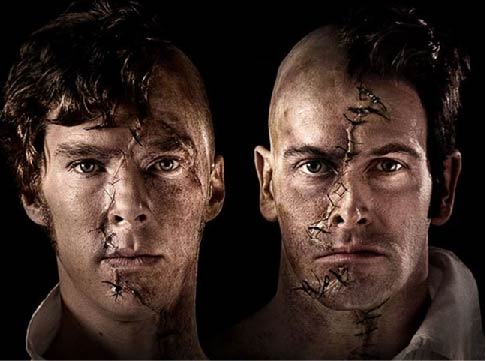Nick Dear’s “Frankenstein” enjoying a fourth live recording encore showing since its initial run in 2011 exemplifies the enduring impact a surpassing piece of stage entertainment can have on audiences. Although the limitations of the recording simply cannot duplicate the original experience, the human touch it provides Mary Shelley’s tale of heartbreaking tragedy and ethical inquiry still translates quite powerfully.
Interchangeable roles
The most important point of chemisty in this play remains Benedict Cumberbatch and Jonny Lee Miller in their interchanging roles as Victor Frankenstein and his monster, but the cast as a whole shines as airtight in terms of performance. In fact, only George Harris’ jarringly overacted performance stood out as a weak link in a collection of otherwise solid performances. Although the showing I saw featured Cumberbatch as Frankenstein and Miller as the monster, the incredibly natural performances each of them gave sparked curiosity about how a role reversal would affect the play’s atmosphere.
Dear works a lot of dry humor into a traditionally dour story, seamlessly woven into dialogue, making the audience laugh while also forcing them to wrestle with extremely complicated emotions. This makes the tough questions raised in Shelley’s novel more palatable, but no less impactful.
Unavoidable discrepancies
The viewing experience suffered from the limitations any live theater recording inevitably carries. The most obvious issue in the viewing experience centers around the lighting, which often became blindingly bright due to the camera’s aperture failure to capture the dazzling array of reflective glass dangling above the stage in a visually pleasing manner. Surprising bursts of light end up translating jarringly on screen, disorienting the audience.
In a similar way, a major disconnect unveiled itself when the cast bowed before the original applauding audience. Unlike movies, which by nature become cultural artifact, this audience applauded a bygone live event. This compared to worshiping to a recorded Hillsong United live concert in forced emotion and painful awkwardness. Regardless of these unavoidable discrepancies, the audience became completely engrossed in the play.
An exploration of human nature
As has become customary in today’s artistic climate, Hollywood stripped Shelley’s original tale of its most challenging aspects, leaving fodder for monster movies behind. The mere fact the monster in this play talked at all surprised my youngest sister because she had grown accustomed to the mindless, moaning giant with green skin and screws sticking out of his neck. Miller’s performance as the monster provides tear-jerking insight into his violent rejection by society and how he assimilated into the cruel world in which he found himself.
In fact, the reaction garnered from his actions ultimately remains sympathetic even as he commits horrible crimes. The knowledge of the unadulterated exposure of his impressionably childlike mind to the depravity of mankind leads one to commiseration with a lost soul rather than condemning a sinner.
Dear presents Shelley’s novel as a sort of creation myth for an age of science, exploring existence and human nature without involving theism. However, Christian undertones permeate his play. Frankenstein’s vapid, egocentric and irresponsible attitude towards science lead to his careless altering of the natural order. His maltreatment of the monster he created, who only wanted a sense of belonging, shows a total lack of empathy towards life.
Frankenstein has no real purpose behind his work, fueled only by a desire to trump the deity he rejected. Believers could read this as a cautionary tale regarding the earthly wisdom from James 3:15. Ultimately, Dear’s adaptation maintains a heart while capturing many of the deeper elements of Shelley’s novel.







